 |
|
CITROËN "C5 BY WIRE"
DEMONSTRATION
VEHICLE
|
|
Citroën is presenting a new technology demonstration
vehicle, "C5 by
Wire". This vehicle reflects two of the objectives
pursued by the
Marque: to develop a vision of the automotive future and
to
continuously devise new solutions to improve driving
pleasure, safety
and interior layout. Originally developed by the
aerospace
industry, “X-by-Wire” technology involves replacing the
mechanical
connections between controls (steering wheel, pedal
assembly, etc.) and
sub-systems (steering, brakes, etc.) with electronic
connections.
This concept is illustrated by the cabin layout of the
Citroën "C5 by
Wire". First, the steering wheel groups the steering,
braking and
acceleration controls, and second, there is no pedal
assembly. The
multifunctional steering wheel thus plays an essential
role.
|
|
Already presented on the C-Crosser
and C-Airdream
concept cars, “X-by-Wire” technology is now being partly
trialled on
the Citroën C5. This production vehicle has a V6 3.0i
engine developing
210 bhp DIN (152 kW), mated with an automatic gearbox.
“X-by-Wire”
technology opens new possibilities in interior design by
replacing
mechanical components such as the pedal assembly and the
steering
column. Grouping all the driving controls on the wheel
is an ergonomic
solution that also promotes easy use. As a result,
controls can be
activated more quickly for enhanced safety.
Operating principle of the driver interface
Essential
driving functions are managed by the driver, who holds
the steering
wheel in the "quarter-to-three" position in order to
activate the
controls.
|
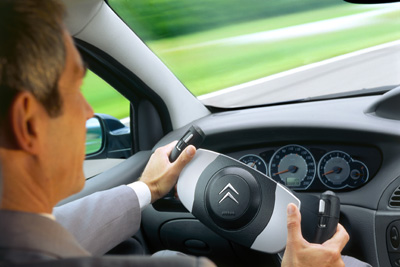 |
|
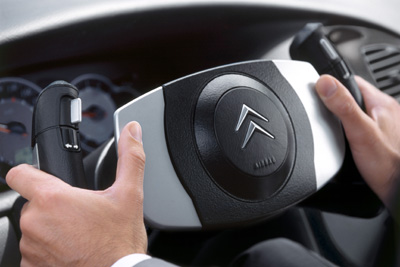
|
The lower and upper parts of the steering wheel hoop
have been removed,
allowing full use of the all-electric variable-ratio
steering, which is
particularly sharp at low speeds.
The driver uses the right or left
thumb to reach the forward-facing acceleration paddles
on either side
of the wheel. It was necessary to provide two paddles in
order to allow
the driver to accelerate and, at the same time, to
activate the
lighting on the left, and the windscreen wipers,
headlamp washers and
horn on the right.
Automatic cruise control is also available to regulate
speed and
enhance driving comfort, avoiding the need for the
driver to keep
pressing the paddles. Cruise control is disconnected
when the driver
brakes or accelerates.
The brakes are controlled by "triggers” located at
either end of the
steering wheel. The driver uses the right or left index
finger to reach
these controls. Brake force is applied intuitively.
These controls are all highly ergonomic. They feel
completely natural
to use, after just a short time behind the wheel.
|
|
The “X-by-Wire” system: technology serving safety
The
multifunctional steering wheel plays an essential role.
Easy to use, it
allows the driver to concentrate on the road, thus
clearly contributing
to safety.
Safety was an essential factor in the development of
“X-by-Wire”
systems for the automotive industry.
The absence of the pedal assembly and steering column
considerably
enhances safety, since the risk of injury in the event
of impact is
significantly reduced.
In addition, the space freed up for the legs improves
ergonomics and
postural comfort.
Also, having the controls on the steering wheel
increases the speed of
execution, particularly when braking. Precious time is
gained, since
the driver no longer has to reach for the brake pedal.
|
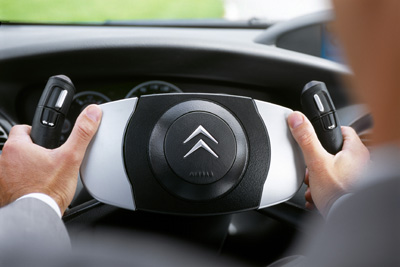 |
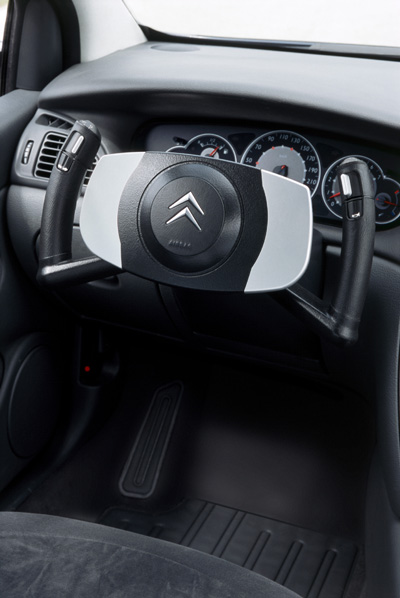 |
Variable-ratio electric steering
The all-electric steering system provides:
-
a
variable steering wheel angle/wheel angle ratio,
adjusted automatically
to suit the driver’s requirements and the speed of
the vehicle. In
particular, this function makes parking much easier,
thanks to the more
direct steering ratio (between one and two turns of
the wheel compared
with three turns in general). This feature also
ensures pin-sharp
steering at high speeds.
-
considerable
latitude in adapting and defining steering
parameters in terms of
torque (controlling wheel vibration, for example),
angle (small turns
of the wheels) and vehicle behaviour (overall
chassis control).
Electro-hydraulic braking system
The
braking system is electro-hydraulic. There is no pedal
assembly, but
the electric button on the steering wheel plays exactly
the same role
as a conventional system. Brake force is applied
progressively, in an
intuitive and natural way. To brake, the driver simply
applies pressure
to one or both of the steering wheel handles.
|
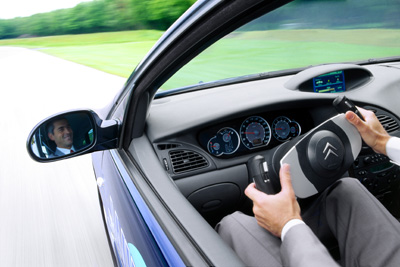 |
|
With the "C5 by Wire", Citroën is exploring new
technological
options. By eliminating mechanical limits and
constraints, it aims to
pioneer more attractive and ergonomic cockpit design
that adapts to the
needs of each driver and brings significant progress
in active safety.
|
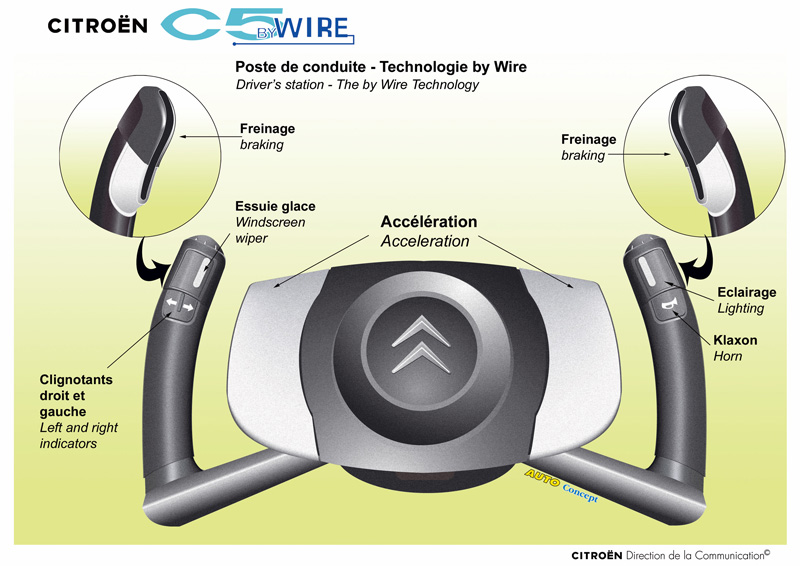 |
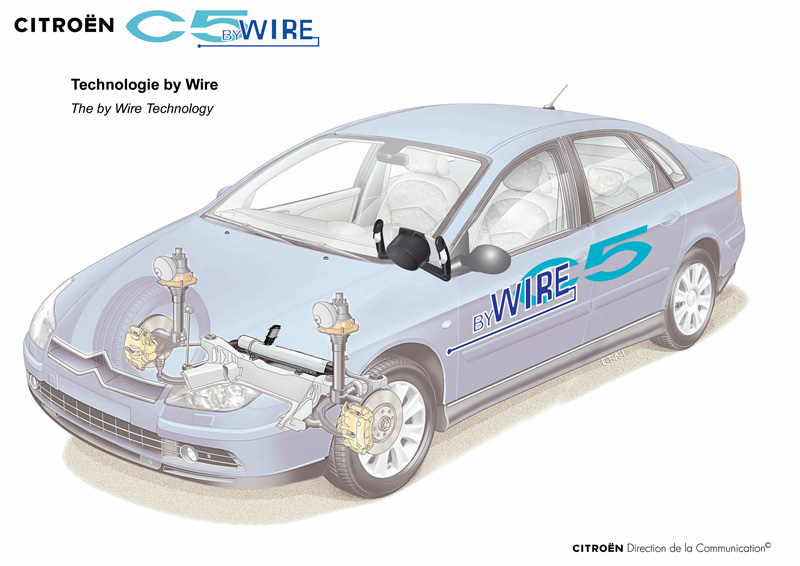 |
|
|
©
2001 Julian
Marsh/Citroënët/SA Automobiles Citroën
|
|
|
|